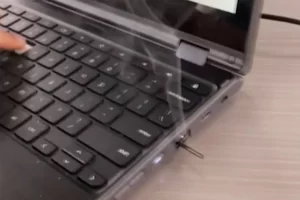By Ben Yeh and Brian Clinton
High school students around the country are engaging in a new, and unhealthy, habit — JUULing, also known as vaping.
JUULing, the most modern form of e-cigarettes on the market are increasingly popular among teenagers and young adults. The growth in the new small compact e-cig can be attributed to its stealthy and concealable design—whilst delivering a fix of nicotine to users.
The likelihood of walking in on students JUULing in either restrooms or locker rooms around the country is increasing, even with school administrations cracking down on students.
Despite only being the size of a flashdrive, each JUUL pod contains 59g/mL of nicotine, the equivalent nicotine content to one pack of cigarettes. This devilishly sly e-cigarette company (PAX) has more negatives besides being the only company to offer such a high nicotine content (around 5%) in their products. The nicotine pods also contain propylene glycol which is also used in antifreeze for cars. In addition, nicotine batteries in vapes are known to explode from time to time.
Ms. Nunnziato, the school’s drug and alcohol counselor, commented on the phenomenon.
“While tobacco usage has been at a record low, there has been a 90% increase in vaping among teenagers. Now instead of vaping being used as a transitional fix to becoming tobacco free, it has become a substitute with teens.”
“The flavoring ingredient used is not intended for inhaling,” said Ms. Nunnziato.
However, many users may not be aware of the greater risks involved.
JUULing packs are relatively easy to purchase. Teens can check a box that they are above 18 years of age on the internet, and then in a few days it is on their front step for the price of $49.99.
Although many students have picked up this new trend among teens, many students see the real problems with picking up a nicotine addiction. One student, who asked not to be named, called it “a pathetic habit.”
According to JUUL Labs, “Minors should not use any nicotine product, including ours. JUUL was created for adult smokers of legal age only and we strive to keep our product out of the hands of minors. Recent science raises concerns about the adverse effects of nicotine on the adolescent brain.”
According to CDC studies, teens who eventually try the product do get addicted, and one in three students who start vaping eventually try cigarettes within a six-month span of the initial vape.





Be First to Comment